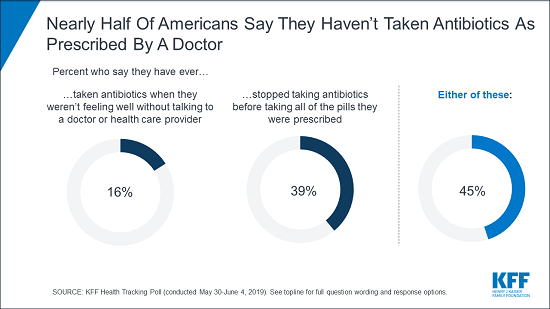|
Just Released
|
||
|
Poll: Most Americans See Antibiotic
Resistance as a Public Health Problem, But Nearly Half Have Not Taken
Antibiotics As Prescribed
While most Americans believe that antibiotic
resistance poses a public health problem, new KFF polling finds nearly half (45%) say they
personally have not taken antibiotics as prescribed – one factor contributing
to the rise of “superbugs” that are resistant to existing treatment.
Those misusing antibiotics includes people who say
they took antibiotics without talking to a doctor or other provider (16%)
and, more commonly, those who say that they did not finish a course of
antibiotics (39%).
The new polling examines the public’s experiences
and knowledge about antibiotic resistance, which occurs when bacteria and
other germs change so that the antibiotic medicines designed to kill them no
longer work.
Most Americans say that they have heard the
various terms used to talk about the issue of the overuse of antibiotics
including antibiotic resistance and superbugs, and they know what these terms
mean.
Other findings include:
Designed and analyzed by public opinion
researchers at KFF, the poll was conducted May 30-June 4, 2019 among a
nationally representative random digit dial telephone sample of 1,206 adults.
Interviews were conducted in English and Spanish by landline (298) and cell
phone (908). The margin of sampling error is plus or minus 3 percentage
points for the full sample. For results based on subgroups, the margin of
sampling error may be higher.
Filling the need for trusted information on
national health issues, the Kaiser Family Foundation is a
nonprofit organization based in San Francisco, California.
|
||
|
|
||
To be a Medicare Agent's source of information on topics affecting the agent and their business, and most importantly, their clientele, is the intention of this site. Sourced from various means rooted in the health insurance industry - insurance carriers, governmental agencies, and industry news agencies, this is aimed as a resource of varying viewpoints to spark critical thought and discussion. We welcome your contributions.
Monday, June 24, 2019
Poll: Most Americans See Antibiotic Resistance as a Public Health Problem, But Nearly Half Have Not Taken Antibiotics As Prescribed
Subscribe to:
Post Comments (Atom)


No comments:
Post a Comment